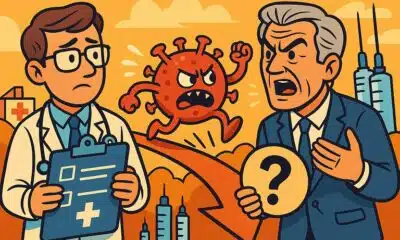Kaiser Health News
Biden Administration to Ban Medical Debt From Americans’ Credit Scores
Noam N. Levey
Thu, 21 Sep 2023 19:47:00 +0000
The Biden administration announced a major initiative to protect Americans from medical debt on Thursday, outlining plans to develop federal rules barring unpaid medical bills from affecting patients’ credit scores.
The regulations, if enacted, would potentially help tens of millions of people who have medical debt on their credit reports, eliminating information that can depress consumers’ scores and make it harder for many to get a job, rent an apartment, or secure a car loan.
New rules would also represent one of the most significant federal actions to tackle medical debt, a problem that burdens about 100 million people and forces legions to take on extra work, give up their homes, and ration food and other essentials, a KFF Health News-NPR investigation found.
“No one in this country should have to go into debt to get the quality health care they need,” said Vice President Kamala Harris, who announced the new moves along with Rohit Chopra, head of the Consumer Financial Protection Bureau, or CFPB. The agency will be charged with developing the new rules.
“These measures will improve the credit scores of millions of Americans so that they will better be able to invest in their future,” Harris said.
Enacting new regulations can be a lengthy process. Administration officials said Thursday that the new rules would be developed next year.
Such an aggressive step to restrict credit reporting and debt collection by hospitals and other medical providers will also almost certainly stir industry opposition.
At the same time, the Consumer Financial Protection Bureau, which was formed in response to the 2008 financial crisis, is under fire from Republicans, and its future may be jeopardized by a case before the Supreme Court, whose conservative majority has been chipping away at federal regulatory powers.
But the move by the Biden administration drew strong praise from patients’ and consumer groups, many of whom have been pushing for years for the federal government to strengthen protections against medical debt.
“This is an important milestone in our collective efforts and will provide immediate relief to people that have unfairly had their credit impacted simply because they got sick,” said Emily Stewart, executive director of Community Catalyst, a Boston nonprofit that has helped lead national medical debt efforts.
Credit reporting, a threat designed to induce patients to pay their bills, is the most common collection tactic used by hospitals, a KFF Health News analysis has shown.
“Negative credit reporting is one of the biggest pain points for patients with medical debt,” said Chi Chi Wu, a senior attorney at the National Consumer Law Center. “When we hear from consumers about medical debt, they often talk about the devastating consequences that bad credit from medical debts has had on their financial lives.”
Although a single black mark on a credit score may not have a huge effect for some people, the impact can be devastating for those with large unpaid medical bills. There is growing evidence, for example, that credit scores depressed by medical debt can threaten people’s access to housing and fuel homelessness in many communities.
At the same time, CFPB researchers have found that medical debt — unlike other kinds of debt — does not accurately predict a consumer’s creditworthiness, calling into question how useful it is on a credit report.
The three largest credit agencies — Equifax, Experian, and TransUnion — said they would stop including some medical debt on credit reports as of last year. The excluded debts included paid-off bills and those less than $500.
But the agencies’ voluntary actions left out millions of patients with bigger medical bills on their credit reports. And many consumer and patient advocates called for more action.
The National Consumer Law Center, Community Catalyst, and some 50 other groups in March sent letters to the CFPB and IRS urging stronger federal action to rein in hospital debt collection.
State leaders also have taken steps to expand consumer protections. In June, Colorado enacted a trailblazing bill that prohibits medical debt from being included on residents’ credit reports or factored into their credit scores.
Many groups have urged the federal government to bar tax-exempt hospitals from selling patient debt or denying medical care to people with past-due bills, practices that remain widespread across the U.S., KFF Health News found.
Hospital leaders and representatives of the debt collection industry have warned that such restrictions on the ability of medical providers to get their bills paid may have unintended consequences, such as prompting more hospitals and physicians to require upfront payment before delivering care.
Looser credit requirements could also make it easier for consumers who can’t handle more debt to get loans they might not be able to pay off, others have warned.
“It is unfortunate that the CFPB and the White House are not considering the host of consequences that will result if medical providers are singled out in their billing, compared to other professions or industries,” said Scott Purcell, chief executive of ACA International, the collection industry’s leading trade association.
About This Project
“Diagnosis: Debt” is a reporting partnership between KFF Health News and NPR exploring the scale, impact, and causes of medical debt in America.
The series draws on original polling by KFF, court records, federal data on hospital finances, contracts obtained through public records requests, data on international health systems, and a yearlong investigation into the financial assistance and collection policies of more than 500 hospitals across the country.
Additional research was conducted by the Urban Institute, which analyzed credit bureau and other demographic data on poverty, race, and health status for KFF Health News to explore where medical debt is concentrated in the U.S. and what factors are associated with high debt levels.
The JPMorgan Chase Institute analyzed records from a sampling of Chase credit card holders to look at how customers’ balances may be affected by major medical expenses. And the CED Project, a Denver nonprofit, worked with KFF Health News on a survey of its clients to explore links between medical debt and housing instability.
KFF Health News journalists worked with KFF public opinion researchers to design and analyze the “KFF Health Care Debt Survey.” The survey was conducted Feb. 25 through March 20, 2022, online and via telephone, in English and Spanish, among a nationally representative sample of 2,375 U.S. adults, including 1,292 adults with current health care debt and 382 adults who had health care debt in the past five years. The margin of sampling error is plus or minus 3 percentage points for the full sample and 3 percentage points for those with current debt. For results based on subgroups, the margin of sampling error may be higher.
Reporters from KFF Health News and NPR also conducted hundreds of interviews with patients across the country; spoke with physicians, health industry leaders, consumer advocates, debt lawyers, and researchers; and reviewed scores of studies and surveys about medical debt.
——————————
By: Noam N. Levey
Title: Biden Administration to Ban Medical Debt From Americans’ Credit Scores
Sourced From: kffhealthnews.org/news/article/medical-debt-credit-score-ban-biden-administration/
Published Date: Thu, 21 Sep 2023 19:47:00 +0000
Kaiser Health News
Dual Threats From Trump and GOP Imperil Nursing Homes and Their Foreign-Born Workers
In a top-rated nursing home in Alexandria, Virginia, the Rev. Donald Goodness is cared for by nurses and aides from various parts of Africa. One of them, Jackline Conteh, a naturalized citizen and nurse assistant from Sierra Leone, bathes and helps dress him most days and vigilantly intercepts any meal headed his way that contains gluten, as Goodness has celiac disease.
“We are full of people who come from other countries,” Goodness, 92, said about Goodwin House Alexandria’s staff. Without them, the retired Episcopal priest said, “I would be, and my building would be, desolate.”
The long-term health care industry is facing a double whammy from President Donald Trump’s crackdown on immigrants and the GOP’s proposals to reduce Medicaid spending. The industry is highly dependent on foreign workers: More than 800,000 immigrants and naturalized citizens comprise 28% of direct care employees at home care agencies, nursing homes, assisted living facilities, and other long-term care companies.
But in January, the Trump administration rescinded former President Joe Biden’s 2021 policy that protected health care facilities from Immigration and Customs Enforcement raids. The administration’s broad immigration crackdown threatens to drastically reduce the number of current and future workers for the industry. “People may be here on a green card, and they are afraid ICE is going to show up,” said Katie Smith Sloan, president of LeadingAge, an association of nonprofits that care for older adults.
Existing staffing shortages and quality-of-care problems would be compounded by other policies pushed by Trump and the Republican-led Congress, according to nursing home officials, resident advocates, and academic experts. Federal spending cuts under negotiation may strip nursing homes of some of their largest revenue sources by limiting ways states leverage Medicaid money and making it harder for new nursing home residents to retroactively qualify for Medicaid. Care for 6 in 10 residents is paid for by Medicaid, the state-federal health program for poor or disabled Americans.
“We are facing the collision of two policies here that could further erode staffing in nursing homes and present health outcome challenges,” said Eric Roberts, an associate professor of internal medicine at the University of Pennsylvania.
The industry hasn’t recovered from covid-19, which killed more than 200,000 long-term care facility residents and workers and led to massive staff attrition and turnover. Nursing homes have struggled to replace licensed nurses, who can find better-paying jobs at hospitals and doctors’ offices, as well as nursing assistants, who can earn more working at big-box stores or fast-food joints. Quality issues that preceded the pandemic have expanded: The percentage of nursing homes that federal health inspectors cited for putting residents in jeopardy of immediate harm or death has risen alarmingly from 17% in 2015 to 28% in 2024.
In addition to seeking to reduce Medicaid spending, congressional Republicans have proposed shelving the biggest nursing home reform in decades: a Biden-era rule mandating minimum staffing levels that would require most of the nation’s nearly 15,000 nursing homes to hire more workers.
The long-term care industry expects demand for direct care workers to burgeon with an influx of aging baby boomers needing professional care. The Census Bureau has projected the number of people 65 and older would grow from 63 million this year to 82 million in 2050.
In an email, Vianca Rodriguez Feliciano, a spokesperson for the Department of Health and Human Services, said the agency “is committed to supporting a strong, stable long-term care workforce” and “continues to work with states and providers to ensure quality care for older adults and individuals with disabilities.” In a separate email, Tricia McLaughlin, a Department of Homeland Security spokesperson, said foreigners wanting to work as caregivers “need to do that by coming here the legal way” but did not address the effect on the long-term care workforce of deportations of classes of authorized immigrants.
Goodwin Living, a faith-based nonprofit, runs three retirement communities in northern Virginia for people who live independently, need a little assistance each day, have memory issues, or require the availability of around-the-clock nurses. It also operates a retirement community in Washington, D.C. Medicare rates Goodwin House Alexandria as one of the best-staffed nursing homes in the country. Forty percent of the organization’s 1,450 employees are foreign-born and are either seeking citizenship or are already naturalized, according to Lindsay Hutter, a Goodwin spokesperson.
“As an employer, we see they stay on with us, they have longer tenure, they are more committed to the organization,” said Rob Liebreich, Goodwin’s president and CEO.
Jackline Conteh spent much of her youth shuttling between Sierra Leone, Liberia, and Ghana to avoid wars and tribal conflicts. Her mother was killed by a stray bullet in her home country of Liberia, Conteh said. “She was sitting outside,” Conteh, 56, recalled in an interview.
Conteh was working as a nurse in a hospital in Sierra Leone in 2009 when she learned of a lottery for visas to come to the United States. She won, though she couldn’t afford to bring her husband and two children along at the time. After she got a nursing assistant certification, Goodwin hired her in 2012.
Conteh said taking care of elders is embedded in the culture of African families. When she was 9, she helped feed and dress her grandmother, a job that rotated among her and her sisters. She washed her father when he was dying of prostate cancer. Her husband joined her in the United States in 2017; she cares for him because he has heart failure.
“Nearly every one of us from Africa, we know how to care for older adults,” she said.
Her daughter is now in the United States, while her son is still in Africa. Conteh said she sends money to him, her mother-in-law, and one of her sisters.
In the nursing home where Goodness and 89 other residents live, Conteh helps with daily tasks like dressing and eating, checks residents’ skin for signs of swelling or sores, and tries to help them avoid falling or getting disoriented. Of 102 employees in the building, broken up into eight residential wings called “small houses” and a wing for memory care, at least 72 were born abroad, Hutter said.
Donald Goodness grew up in Rochester, New York, and spent 25 years as rector of The Church of the Ascension in New York City, retiring in 1997. He and his late wife moved to Alexandria to be closer to their daughter, and in 2011 they moved into independent living at the Goodwin House. In 2023 he moved into one of the skilled nursing small houses, where Conteh started caring for him.
“I have a bad leg and I can’t stand on it very much, or I’d fall over,” he said. “She’s in there at 7:30 in the morning, and she helps me bathe.” Goodness said Conteh is exacting about cleanliness and will tell the housekeepers if his room is not kept properly.
Conteh said Goodness was withdrawn when he first arrived. “He don’t want to come out, he want to eat in his room,” she said. “He don’t want to be with the other people in the dining room, so I start making friends with him.”
She showed him a photo of Sierra Leone on her phone and told him of the weather there. He told her about his work at the church and how his wife did laundry for the choir. The breakthrough, she said, came one day when he agreed to lunch with her in the dining room. Long out of his shell, Goodness now sits on the community’s resident council and enjoys distributing the mail to other residents on his floor.
“The people that work in my building become so important to us,” Goodness said.
While Trump’s 2024 election campaign focused on foreigners here without authorization, his administration has broadened to target those legally here, including refugees who fled countries beset by wars or natural disasters. This month, the Department of Homeland Security revoked the work permits for migrants and refugees from Cuba, Haiti, Nicaragua, and Venezuela who arrived under a Biden-era program.
“I’ve just spent my morning firing good, honest people because the federal government told us that we had to,” Rachel Blumberg, president of the Toby & Leon Cooperman Sinai Residences of Boca Raton, a Florida retirement community, said in a video posted on LinkedIn. “I am so sick of people saying that we are deporting people because they are criminals. Let me tell you, they are not all criminals.”
At Goodwin House, Conteh is fearful for her fellow immigrants. Foreign workers at Goodwin rarely talk about their backgrounds. “They’re scared,” she said. “Nobody trusts anybody.” Her neighbors in her apartment complex fled the U.S. in December and returned to Sierra Leone after Trump won the election, leaving their children with relatives.
“If all these people leave the United States, they go back to Africa or to their various countries, what will become of our residents?” Conteh asked. “What will become of our old people that we’re taking care of?”
KFF Health News is a national newsroom that produces in-depth journalism about health issues and is one of the core operating programs at KFF—an independent source of health policy research, polling, and journalism. Learn more about KFF.
Subscribe to KFF Health News’ free Morning Briefing.
This article first appeared on KFF Health News and is republished here under a Creative Commons license.
The post Dual Threats From Trump and GOP Imperil Nursing Homes and Their Foreign-Born Workers appeared first on kffhealthnews.org
Note: The following A.I. based commentary is not part of the original article, reproduced above, but is offered in the hopes that it will promote greater media literacy and critical thinking, by making any potential bias more visible to the reader –Staff Editor.
Political Bias Rating: Center-Left
This content primarily highlights concerns about the impact of restrictive immigration policies and Medicaid spending cuts proposed by the Trump administration and Republican lawmakers on the long-term care industry. It emphasizes the importance of immigrant workers in healthcare, the challenges that staffing shortages pose to patient care, and the potential negative effects of GOP policy proposals. The tone is critical of these policies while sympathetic toward immigrant workers and advocates for maintaining or increasing government support for healthcare funding. The framing aligns with a center-left perspective, focusing on social welfare, immigrant rights, and concern about the consequences of conservative economic and immigration policies without descending into partisan rhetoric.
Kaiser Health News
California’s Much-Touted IVF Law May Be Delayed Until 2026, Leaving Many in the Lurch
California lawmakers are poised to delay the state’s much-ballyhooed new law mandating in vitro fertilization insurance coverage for millions, set to take effect July 1. Gov. Gavin Newsom has asked lawmakers to push the implementation date to January 2026, leaving patients, insurers, and employers in limbo.
The law, SB 729, requires state-regulated health plans offered by large employers to cover infertility diagnosis and treatment, including IVF. Nine million people will qualify for coverage under the law. Advocates have praised the law as “a major win for Californians,” especially in making same-sex couples and aspiring single parents eligible, though cost concerns limited the mandate’s breadth.
People who had been planning fertility care based on the original timeline are now “left in a holding pattern facing more uncertainty, financial strain, and emotional distress,” Alise Powell, a director at Resolve: The National Infertility Association, said in a statement.
During IVF, a patient’s eggs are retrieved, combined with sperm in a lab, and then transferred to a person’s uterus. A single cycle can total around $25,000, out of reach for many. The California law requires insurers to cover up to three egg retrievals and an unlimited number of embryo transfers.
Not everyone’s coverage would be affected by the delay. Even if the law took effect July 1, it wouldn’t require IVF coverage to start until the month an employer’s contract renews with its insurer. Rachel Arrezola, a spokesperson for the California Department of Managed Health Care, said most of the employers subject to the law renew their contracts in January, so their employees would not be affected by a delay.
She declined to provide data on the percentage of eligible contracts that renew in July or later, which would mean those enrollees wouldn’t get IVF coverage until at least a full year from now, in July 2026 or later.
The proposed new implementation date comes amid heightened national attention on fertility coverage. California is now one of 15 states with an IVF mandate, and in February, President Donald Trump signed an executive order seeking policy recommendations to expand IVF access.
It’s the second time Newsom has asked lawmakers to delay the law. When the Democratic governor signed the bill in September, he asked the legislature to consider delaying implementation by six months. The reason, Newsom said then, was to allow time to reconcile differences between the bill and a broader effort by state regulators to include IVF and other fertility services as an essential health benefit, which would require the marketplace and other individual and small-group plans to provide the coverage.
Newsom spokesperson Elana Ross said the state needs more time to provide guidance to insurers on specific services not addressed in the law to ensure adequate and uniform coverage. Arrezola said embryo storage and donor eggs and sperm were examples of services requiring more guidance.
State Sen. Caroline Menjivar, a Democrat who authored the original IVF mandate, acknowledged a delay could frustrate people yearning to expand their families, but requested patience “a little longer so we can roll this out right.”
Sean Tipton, a lobbyist for the American Society for Reproductive Medicine, contended that the few remaining questions on the mandate did not warrant a long delay.
Lawmakers appear poised to advance the delay to a vote by both houses of the legislature, likely before the end of June. If a delay is approved and signed by the governor, the law would immediately be paused. If this does not happen before July 1, Arrezola said, the Department of Managed Health Care would enforce the mandate as it exists. All plans were required to submit compliance filings to the agency by March. Arrezola was unable to explain what would happen to IVF patients whose coverage had already begun if the delay passes after July 1.
The California Association of Health Plans, which opposed the mandate, declined to comment on where implementation efforts stand, although the group agrees that insurers need more guidance, spokesperson Mary Ellen Grant said.
Kaiser Permanente, the state’s largest insurer, has already sent employers information they can provide to their employees about the new benefit, company spokesperson Kathleen Chambers said. She added that eligible members whose plans renew on or after July 1 would have IVF coverage if implementation of the law is not delayed.
Employers and some fertility care providers appear to be grappling over the uncertainty of the law’s start date. Amy Donovan, a lawyer at insurance brokerage and consulting firm Keenan & Associates, said the firm has fielded many questions from employers about the possibility of delay. Reproductive Science Center and Shady Grove Fertility, major clinics serving different areas of California, posted on their websites that the IVF mandate had been delayed until January 2026, which is not yet the case. They did not respond to requests for comment.
Some infertility patients confused over whether and when they will be covered have run out of patience. Ana Rios and her wife, who live in the Central Valley, had been trying to have a baby for six years, dipping into savings for each failed treatment. Although she was “freaking thrilled” to learn about the new law last fall, Rios could not get clarity from her employer or health plan on whether she was eligible for the coverage and when it would go into effect, she said. The couple decided to go to Mexico to pursue cheaper treatment options.
“You think you finally have a helping hand,” Rios said of learning about the law and then, later, the requested delay. “You reach out, and they take it back.”
This article was produced by KFF Health News, which publishes California Healthline, an editorially independent service of the California Health Care Foundation.
KFF Health News is a national newsroom that produces in-depth journalism about health issues and is one of the core operating programs at KFF—an independent source of health policy research, polling, and journalism. Learn more about KFF.
USE OUR CONTENT
This story can be republished for free (details).
KFF Health News is a national newsroom that produces in-depth journalism about health issues and is one of the core operating programs at KFF—an independent source of health policy research, polling, and journalism. Learn more about KFF.
Subscribe to KFF Health News’ free Morning Briefing.
This article first appeared on KFF Health News and is republished here under a Creative Commons license.
The post California’s Much-Touted IVF Law May Be Delayed Until 2026, Leaving Many in the Lurch appeared first on kffhealthnews.org
Note: The following A.I. based commentary is not part of the original article, reproduced above, but is offered in the hopes that it will promote greater media literacy and critical thinking, by making any potential bias more visible to the reader –Staff Editor.
Political Bias Rating: Center-Left
This content is presented in a factual, balanced manner typical of center-left public policy reporting. It focuses on a progressive healthcare issue (mandated IVF insurance coverage) favorably highlighting benefits for diverse family structures and individuals, including same-sex couples and single parents, which often aligns with center-left values. At the same time, it includes perspectives from government officials, industry representatives, opponents, and patients, offering a nuanced view without overt ideological framing or partisan rhetoric. The emphasis on healthcare access, social equity, and patient impact situates the coverage within a center-left orientation.
Kaiser Health News
Push To Move OB-GYN Exam Out of Texas Is Piece of AGs’ Broader Reproductive Rights Campaign
Democratic state attorneys general led by those from California, New York, and Massachusetts are pressuring medical professional groups to defend reproductive rights, including medication abortion, emergency abortions, and travel between states for health care in response to recent increases in the number of abortion bans.
The American Medical Association adopted a formal position June 9 recommending that medical certification exams be moved out of states with restrictive abortion policies or made virtual, after 20 attorneys general petitioned to protect physicians who fear legal repercussions because of their work. The petition focused on the American Board of Obstetrics and Gynecology’s certification exams in Dallas, and the subsequent AMA recommendation was hailed as a win for Democrats trying to regain ground after the fall of Roe v. Wade.
“It seems incremental, but there are so many things that go into expanding and maintaining access to care,” said Arneta Rogers, executive director of the Center on Reproductive Rights and Justice at the University of California-Berkeley’s law school. “We see AGs banding together, governors banding together, as advocates work on the ground. That feels somewhat more hopeful — that people are thinking about a coordinated strategy.”
Since the Supreme Court eliminated the constitutional right to an abortion in 2022, 16 states, including Texas, have implemented laws banning abortion almost entirely, and many of them impose criminal penalties on providers as well as options to sue doctors. More than 25 states restrict access to gender-affirming care for trans people, and six of them make it a felony to provide such care to youth.
That’s raised concern among some physicians who fear being charged if they go to those states, even if their home state offers protection to provide reproductive and gender-affirming health care.
Pointing to the recent fining and indictment of a physician in New York who allegedly provided abortion pills to a woman in Texas and a teen in Louisiana, a coalition of physicians wrote in a letter to the American Board of Obstetrics and Gynecology that “the limits of shield laws are tenuous” and that “Texas laws can affect physicians practicing outside of the state as well.”
The campaign was launched by several Democratic attorneys general, including Rob Bonta of California, Andrea Joy Campbell of Massachusetts, and Letitia James of New York, who each have established a reproductive rights unit as a bulwark for their state following the Dobbs decision.
“Reproductive health care and gender-affirming care providers should not have to risk their safety or freedom just to advance in their medical careers,” James said in a statement. “Forcing providers to travel to states that have declared war on reproductive freedom and LGBTQ+ rights is as unnecessary as it is dangerous.”
In their petition, the attorneys general included a letter from Joseph Ottolenghi, medical director at Choices Women’s Medical Center in New York City, who was denied his request to take the test remotely or outside of Texas. To be certified by the American Board of Obstetrics and Gynecology, physicians need to take the in-person exam at its testing facility in Dallas. The board completed construction of its new testing facility last year.
“As a New York practitioner, I have made every effort not to violate any other state’s laws, but the outer contours of these draconian laws have not been tested or clarified by the courts,” Ottolenghi wrote.
Rachel Rebouché, the dean of Temple University’s law school and a reproductive law scholar, said “putting the heft” of the attorneys general behind this effort helps build awareness and a “public reckoning” on behalf of providers. Separately, some doctors have urged medical conferences to boycott states with abortion bans.
Anti-abortion groups, however, see the campaign as forcing providers to conform to abortion-rights views. Donna Harrison, an OB-GYN and the director of research at the American Association of Pro-Life Obstetricians and Gynecologists, described the petition as an “attack not only on pro-life states but also on life-affirming medical professionals.”
Harrison said the “OB-GYN community consists of physicians with values that are as diverse as our nation’s state abortion laws,” and that this diversity “fosters a medical environment of debate and rigorous thought leading to advancements that ultimately serve our patients.”
The AMA’s new policy urges specialty medical boards to host exams in states without restrictive abortion laws, offer the tests remotely, or provide exemptions for physicians. However, the decision to implement any changes to the administration of these exams is up to those boards. There is no deadline for a decision to be made.
The OB-GYN board did not respond to requests for comment, but after the public petition from the attorneys general criticizing it for refusing exam accommodations, the board said that in-person exams conducted at its national center in Dallas “provide the most equitable, fair, secure, and standardized assessment.”
The OB-GYN board emphasized that Texas’ laws apply to doctors licensed in Texas and to medical care within Texas, specifically. And it noted that its exam dates are kept under wraps, and that there have been “no incidents of harm to candidates or examiners across thousands of in-person examinations.”
Democratic state prosecutors, however, warned in their petition that the “web of confusing and punitive state-based restrictions creates a legal minefield for medical providers.” Texas is among the states that have banned doctors from providing gender-affirming care to transgender youth, and it has reportedly made efforts to get records from medical facilities and professionals in other states who may have provided that type of care to Texans.
The Texas attorney general’s office did not respond to requests for comment.
States such as California and New York have laws to block doctors from being extradited under other states’ laws and to prevent sharing evidence against them. But instances that require leveraging these laws could still mean lengthy legal proceedings.
“We live in a moment where we’ve seen actions by executive bodies that don’t necessarily square with what we thought the rules provided,” Rebouché said.
This article was produced by KFF Health News, which publishes California Healthline, an editorially independent service of the California Health Care Foundation.
KFF Health News is a national newsroom that produces in-depth journalism about health issues and is one of the core operating programs at KFF—an independent source of health policy research, polling, and journalism. Learn more about KFF.
USE OUR CONTENT
This story can be republished for free (details).
KFF Health News is a national newsroom that produces in-depth journalism about health issues and is one of the core operating programs at KFF—an independent source of health policy research, polling, and journalism. Learn more about KFF.
Subscribe to KFF Health News’ free Morning Briefing.
This article first appeared on KFF Health News and is republished here under a Creative Commons license.
The post Push To Move OB-GYN Exam Out of Texas Is Piece of AGs’ Broader Reproductive Rights Campaign appeared first on kffhealthnews.org
Note: The following A.I. based commentary is not part of the original article, reproduced above, but is offered in the hopes that it will promote greater media literacy and critical thinking, by making any potential bias more visible to the reader –Staff Editor.
Political Bias Rating: Center-Left
The article presents a viewpoint largely aligned with progressive and Democratic positions on reproductive rights and gender-affirming care. It highlights efforts led by Democratic attorneys general and the American Medical Association to protect abortion access and transgender healthcare amid restrictive state laws, portraying these actions positively. While it includes perspectives from anti-abortion advocates, their views are presented briefly and framed as opposition to the broader pro-choice initiatives. The overall tone and framing emphasize support for reproductive freedom and healthcare protections, reflecting a center-left leaning stance typical of mainstream health policy reporting sympathetic to Democratic policy goals.
-
News from the South - Tennessee News Feed7 days ago
Thieves take thousands of dollars in equipment from Union County Soccer League
-
Mississippi Today4 days ago
Defendant in auditor’s ‘second largest’ embezzlement case in history goes free
-
News from the South - Texas News Feed6 days ago
Robert Nichols to retire from Texas Senate
-
News from the South - Louisiana News Feed6 days ago
3 lawsuits filed against CVS, Louisiana AG announces
-
News from the South - Missouri News Feed6 days ago
Residents provide feedback in Kearney Street Corridor redevelopment meeting
-
News from the South - Alabama News Feed6 days ago
News 5 NOW at 12:30pm | June 24, 2025
-
The Conversation6 days ago
The Vera C. Rubin Observatory will help astronomers investigate dark matter, continuing the legacy of its pioneering namesake
-
News from the South - Florida News Feed6 days ago
DeSantis signs bill into law that ensures public access to Florida beaches | Florida















































